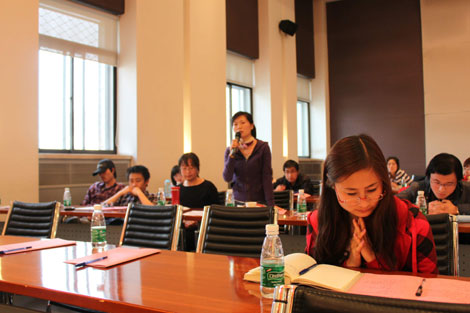Society
Achy breaky heart
Updated: 2011-05-10 08:00
By Mei Jia and Guo Shuhan (China Daily)
|
|
More youngsters are struggling with relationship problems on campus and a proposed compulsory course on the affairs of the heart may just be the balm to soothe these disturbed souls. Mei Jia and Guo Shuhan report.
Xiao Wei, a senior student of Peking University, will never forget the two depressing months he spent getting dragged out for beer and long conversations night after night by a roommate who simply could not come to terms with his breakup. "I was startled to see how an energetic and positive individual like him had suddenly turned into this depressed person, lingering in bed till noon, doing nothing all day and hanging out till late at night," he says, "But I could do little to help other than listen to his rants."
It is to help such people that the Beijing Municipal Commission of Education is considering running compulsory courses in universities to teach college students how to deal with affairs of the heart.
In early April, the committee issued new university guidelines for mental health education, including relationship issues.
Aimed at preventing psychological problems from turning into tragedies, the courses are designed to address common problems such as breakups and same-sex love.
Originally intended as an optional course, it is now considered a compulsory one.
The move has triggered wide debate but most students, teachers and researchers are in agreement about the need for such education.
Xia Cuicui, a teacher with the Psychological Consulting Center of Beijing Normal University, says around 15 percent of the 250 students who turn to the counselors every year, seek help with relationship problems.
Xia says the real number of troubled students could be much higher as a number of students hesitate to approach the counselors, grappling with their pain alone, with disastrous consequences in some cases.
"Most of the students magnify their problems when frustrated in love," Xia says. "They then lose the confidence to strike a balance in their lives."
Some students are also troubled by a lack of courage to express their love and are unclear about what they want in a partner, Xia says.
She recalls the case of an academically gifted girl who, despite a host of pursuers, chose an average boy. She told Xia she did a lot for him, even helping him with school work, but the boy broke up with her a year later.
"I really don't understand why I'm dumped," the girl told Xia during a consultation, saying she felt humiliated.
Xia advised the girl to take setbacks in love in stride, and as a normal part of maturing.
The teacher, who has been running the optional course, Intimate Relationship and Self-growth, for four years, believes guiding people through relationships is crucial to building their positive self-image.
Wang Hongqi, veteran researcher of women studies at Capital Normal University (CNU), agrees and says since university students are at the threshold of forming relationships, this is the right time for such "love education".
Wang believes the emotional problems faced by today's youngsters have to be seen in the larger context of a society in transition, pointing to changing attitudes in the choice of a spouse in recent decades. The overriding emphasis is on the position one occupies in society and the wealth one possesses.
Many young people lack a value system to guide their choices, she says.
The way out is to define "a set of up-to-date values for the 21st century", she adds.
As director of China Research Base on Women Culture under CNU, she believes having campus forums on issues of love and marriage can help this process.
At one such forum held on April 16, writer Cui Manli, speaking to some 100 CNU students, said they should not assess themselves based on others' value systems.
A random survey of 92 post-graduate students conducted that day showed that 43.8 percent would agree to a blind date, premarital sex, "naked" marriages (where both partners start their marital life from scratch) and "blitz" marriages (where couples get married soon after their first meeting).
Li Tonggui, a psychology teacher at Peking University, says relationship problems are often a result of different perceptions of love as shaped by one's education, friends and social experiences.
He says the ultimate goal is to teach young adults about how to establish and maintain healthy personal relationships with everyone, and not just between lovers.
The Peking University student Xiao Wei, one of Li's students, hopes the proposed course will help strengthen traditional values.
"There is too much emphasis on the material aspects at present," he says.
But Wang Shiyi, a senior at Beijing Foreign Studies University, fears the course may not be of much practical help.
|
|
Specials

Room at the inn
The Chinese hotel industry experiences a building boom, prompting fears of oversupply.

Finding the true value
Limited access to qualified appraisers makes investing in antiques a risky proposition

Pearls of wisdom
Chinese pearl farmers dominate the world market but now want to work smarter, not harder

